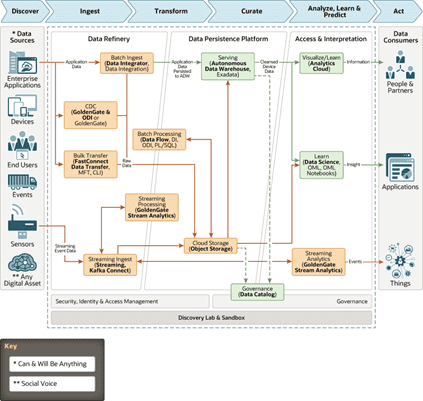Why Companies Are Moving Their Analytics to Oracle Cloud
Author: Jorge Anicama | | August 12, 2021
More and more organizations are moving their analytics to the cloud—and Oracle is one of the most popular destinations. In a November 2020 ranking by Cloud Wars, Oracle was the second fastest-growing cloud vendor with an estimated quarterly revenue growth of 33 percent, behind only Google Cloud.
Looking to move your own analytics workflows to Oracle Cloud? As an Oracle Platinum Partner, Datavail has the skills and experience that companies need to make their next Oracle cloud analytics migration a success. Below, we will go over the benefits of running analytics in the Oracle Cloud, as well as some tips, tricks, and best practices for an Oracle cloud analytics migration.

The Benefits of Analytics on Oracle Cloud
Choosing the right cloud analytics partner is an essential part of a successful migration—so why Oracle Cloud? Migrating analytics to the Oracle cloud has the following benefits:
- Lower IT costs: By saving money on expenses such as on-premises hardware, software licenses, and ongoing support and maintenance, many organizations find that cloud analytics is significantly more cost-effective.
- Increased scalability and flexibility: Instead of running up against hardware constraints, organizations can make their analytics workloads more scalable and flexible by migrating to the cloud. Oracle Cloud Analytics makes it easy for users to scale their usage of Oracle Compute Units (OCPUs) up or down as necessary.
- Data backup and business continuity: Backing up your business-critical information using Oracle Database Backup Cloud Service is essential for recovering quickly from data loss or disaster.
Tips and Tricks for Moving Analytics to Oracle Cloud
While there are many advantages of Oracle cloud analytics, moving your analytics platform to the cloud is not as easy as just snapping your fingers. Below, we offer some advice and best practices for an Oracle cloud analytics migration.
- Start simple
The Oracle cloud ecosystem is vast, encompassing a wide range of services—just getting started can be intimidating and confusing. By starting small and simple with a pilot project, you can rack up a few “quick wins” that will convince key stakeholders of the benefits of an Oracle cloud migration.
- Take full advantage of the Oracle ecosystem
That said, there is no shortage of synergies in the Oracle ecosystem that your organization can realize when you do ramp up your use of the Oracle cloud.
One of Datavail’s clients, a healthcare and pharmaceutical company, was originally facing substantial barriers to effective data management and reporting. Although the client was using Oracle NetSuite cloud software for enterprise resource planning (ERP), the software’s output was simply dumped in Excel.
Datavail helped the client build a scalable financial reporting repository in Oracle Analytics Cloud (OAC) that allows for ad hoc queries and drill-through analyses, getting smarter business insights from their data. In addition, the client now uses other Oracle tools such as Oracle Smart View and Oracle Data Visualization Desktop (DVD) for sharing and visualizing the outputs of their ETL process.
- Use Oracle migration tools
Oracle’s ecosystem also extends to its cloud migration tools. For one, Oracle offers cloning tools for “lift and shift” migrations that copy data and applications to the cloud without modification. Meanwhile, Oracle GoldenGate Cloud Service is used for real-time replication of information mission-critical databases that can’t suffer downtime during the migration. The right Oracle migration partner can help advise you on the steps to take and the best tools to use throughout your move.
How Datavail Can Help
Datavail is an Oracle Partner, with years of experience helping businesses migrate to the Oracle cloud. We have the knowledge and skillset to make your next Oracle cloud migration a success. Our suite of Oracle cloud migration services includes:
- Selecting the right cloud technologies for your business.
- Completing a cloud readiness assessment of your organization.
- Developing a cloud migration roadmap with an appropriate timeline.
- Creating a total cost of ownership (TCO) estimate and deploying a proof of concept.
- Uplifting analytics solutions from on-premises to the cloud.
- Providing ongoing cloud support, maintenance, and management.
Conclusion
Want to see the benefits of moving your analytics to Oracle Cloud for yourself? Get in touch with Datavail’s team of cloud migration experts today for a chat about your business needs and objectives—or download our white paper “Across the Continent with Cloud Analytics” to see how 8 of our clients have leveraged cloud analytics to their advantage.
Related Posts
Oracle BI Publisher (BIP) Tips: Functions, Calculations & More
Check out these BI Publisher tips including functions & calculations so you can understand more about the production and support of BI Publisher reports.
How to Index a Fact Table – A Best Practice
At the base of any good BI project is a solid data warehouse or data mart.
Qlik vs. Tableau vs. Power BI: Which BI Tool Is Right for You?
Tableau, Power BI, and Qlik each have their benefits. What are they and how do you choose? Read this blog post for a quick analysis.



